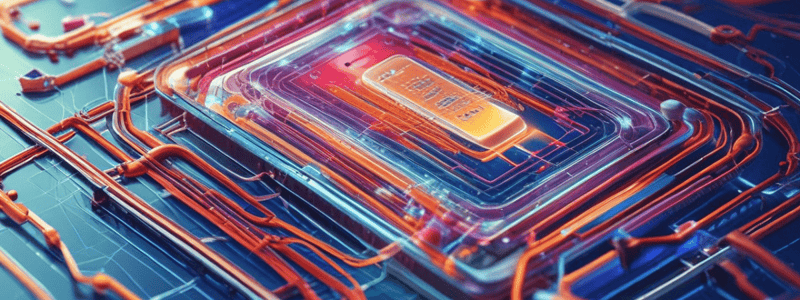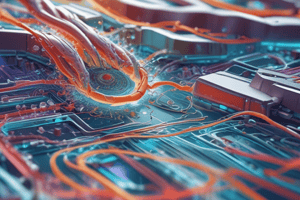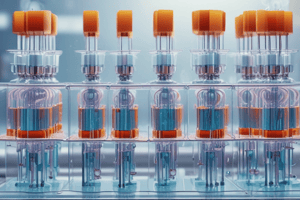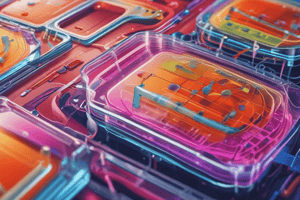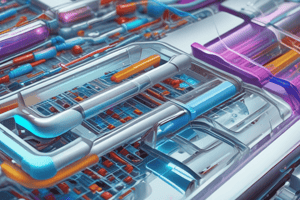Podcast
Questions and Answers
The equilibrium potential is also known as the open circuit potential.
The equilibrium potential is also known as the open circuit potential.
True
The equilibrium potential is the point at which there is maximum current flow through the interface.
The equilibrium potential is the point at which there is maximum current flow through the interface.
False
Without an energy supply from outside, charge transfer across the electrolyte-electrode interface is still possible.
Without an energy supply from outside, charge transfer across the electrolyte-electrode interface is still possible.
False
Ionic current can be converted to electric current across the interface of a metallic electrode submerged in an electrolyte.
Ionic current can be converted to electric current across the interface of a metallic electrode submerged in an electrolyte.
Signup and view all the answers
The Nernst Equation is primarily used to describe the behavior of gases in a microfluidic system.
The Nernst Equation is primarily used to describe the behavior of gases in a microfluidic system.
Signup and view all the answers
The interface between an electrode and electrolyte results in the formation of an electrical double layer (EDL).
The interface between an electrode and electrolyte results in the formation of an electrical double layer (EDL).
Signup and view all the answers
The Nernst Equation describes the relationship between the voltage across a metal electrode and the reference electrode.
The Nernst Equation describes the relationship between the voltage across a metal electrode and the reference electrode.
Signup and view all the answers
Bio-MEMS stands for Biological Micro Electro Mechanical Systems.
Bio-MEMS stands for Biological Micro Electro Mechanical Systems.
Signup and view all the answers
The interface between a metal working electrode and electrolyte does not involve specific adsorption of ions or polar molecules.
The interface between a metal working electrode and electrolyte does not involve specific adsorption of ions or polar molecules.
Signup and view all the answers
Electrolyte-Electrode Interface Lecture focuses on the resistance of the metal electrodes.
Electrolyte-Electrode Interface Lecture focuses on the resistance of the metal electrodes.
Signup and view all the answers
Microfluidic Systems play a crucial role in the field of Bio-MEMS.
Microfluidic Systems play a crucial role in the field of Bio-MEMS.
Signup and view all the answers
The Butler-Volmer equation applies to all real electrochemical systems, regardless of the presence of diffusion processes.
The Butler-Volmer equation applies to all real electrochemical systems, regardless of the presence of diffusion processes.
Signup and view all the answers
Rct, the charge transfer resistance, depends only on the kind of reaction and temperature.
Rct, the charge transfer resistance, depends only on the kind of reaction and temperature.
Signup and view all the answers
The Electrode Double-Layer (EDL) capacitance depends on electrode roughness and adsorption of impurities.
The Electrode Double-Layer (EDL) capacitance depends on electrode roughness and adsorption of impurities.
Signup and view all the answers
In the Randles Model from 1947, Rs stands for Resistance Solution.
In the Randles Model from 1947, Rs stands for Resistance Solution.
Signup and view all the answers
The overvoltage in the Butler-Volmer equation is calculated as E - Eeq.
The overvoltage in the Butler-Volmer equation is calculated as E - Eeq.
Signup and view all the answers
The Cathodic current at the Electrolyte-Electrode Interface can have an alpha value of 0.25.
The Cathodic current at the Electrolyte-Electrode Interface can have an alpha value of 0.25.
Signup and view all the answers
